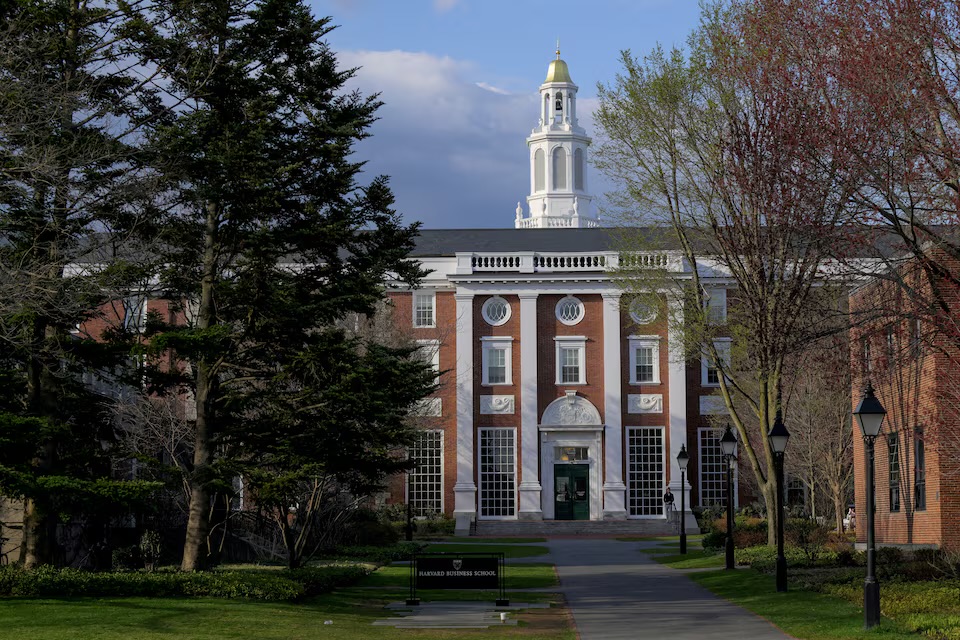By Fatimah Idera and Elizabeth Oso
At Harvard University, the Trump administration ordered U.S. embassies to halt new visa interview appointments for international students and exchange visitors. This has stunned academic institutions around the world.
The directive, outlined in an internal State Department cable signed by Secretary of State Marco Rubio, marked a dramatic shift in U.S. immigration and education policy.
The cable instructed consulates globally to suspend the scheduling of new F, M, and J visa interviews, the most common categories for international students, exchange scholars, and vocational trainees. The justification is a planned expansion of social media vetting for all applicants. Until the revised screening procedures take effect, embassies have been barred from increasing student visa appointment capacity.
While the administration claimed the move was temporary and would not affect students who already had interviews scheduled, it offered no timeline for when the halt would be lifted. This would result in thousands of prospective students finding themselves in a bureaucratic limbo, especially those with dreams of attending elite institutions like Harvard University.
The policy surfaced amid rising tensions between the Trump administration and U.S. universities perceived to be sympathetic to pro-Palestinian student activism. In a particularly alarming development, the administration revoked Harvard’s authorisation to enrol new international students. The university, where 27% of the student body is made up of international students, now faces a potential admissions crisis with global implications.
Cornerstone of America’s higher education system
International students have long been a cornerstone of America’s higher education system. In the 2023–2024 academic year, more than 1.13 million foreign students were enrolled in U.S. institutions, according to the Open Doors report from the Institute of International Education. A significant majority, 71.5%, came from Asia, particularly India and China. These students contribute not only to academic advancement and cultural richness but also to the U.S. economy, injecting billions annually through tuition and living expenses.
But the concern extends beyond logistics into ideology. Several recent cases suggested that the administration’s crackdown wasn’t solely about national security. In March, Columbia University PhD candidate Ranjani Srinivasan had her valid visa revoked, allegedly due to her social media posts critical of Israel’s actions in Gaza and her support for Palestinian rights. Her case raises disturbing questions about freedom of speech and the criminalisation of political expression.
The following questions have been asked: Is the U.S. government beginning to police ideas under the banner of national security? Has dissent, even peaceful, legal dissent, become a disqualifier for education in America?
Implications of Harvard policy on prospective students, the U.S.
For prospective students, the implications remain chilling. Gaining admission to a U.S. university is no longer enough. Social media history, political activity, and even signed petitions may now be scrutinised with the same intensity as academic transcripts or bank statements.
For the U.S., the consequences could be long-lasting. American universities have long been a magnet for global talent, a cornerstone of the country’s soft power. This sudden hardline shift threatens to tarnish that image. Already, many students may now turn their attention to more predictable and inclusive destinations, such as Canada, the UK, or Australia.
And for universities like Harvard, this policy poses a direct challenge to their global mission and their role as bastions of free thought. When institutions of higher learning are punished for the voices they nurture, the message is clear: critical thinking is no longer welcome, not when it makes those in power uncomfortable.
The administration may have framed this move as a security measure. But for thousands of aspiring minds across the world, it feels like a lock on the door of opportunity, and a warning that even the pursuit of knowledge must now pass an ideological litmus test.
With Harvard drawing 27% of its students from abroad, a sudden drop in international enrollment could drastically reduce revenue, affecting research funding and economic vitality.
Meanwhile, any international students are to consider alternative universities of their choice in Europe, Canada, and Australia
Here are excellent universities both in the U.S. and abroad with strong academic reputations. For the alternatives in the US, students can consider Columbia University (NYC, Ivy League), the University of Chicago (Chicago, IL), Massachusetts Institute of Technology (MIT).
While for the International universities which are: University of Oxford & University of Cambridge (UK), University of Toronto & University of British Columbia (Canada), Australian National University & University of Melbourne (Australia).
However, the Trump–Harvard visa ban has set a serious precedent with ripple effects across U.S. higher education, and Prospective students should apply diversely to help balance top U.S. choices with global alternatives to ensure fallback options in case of future policy shifts.



